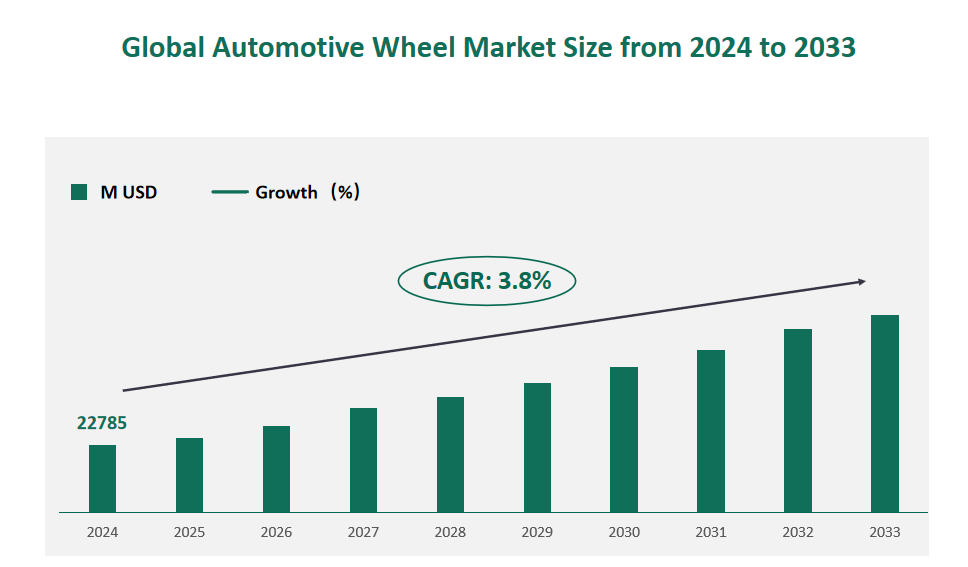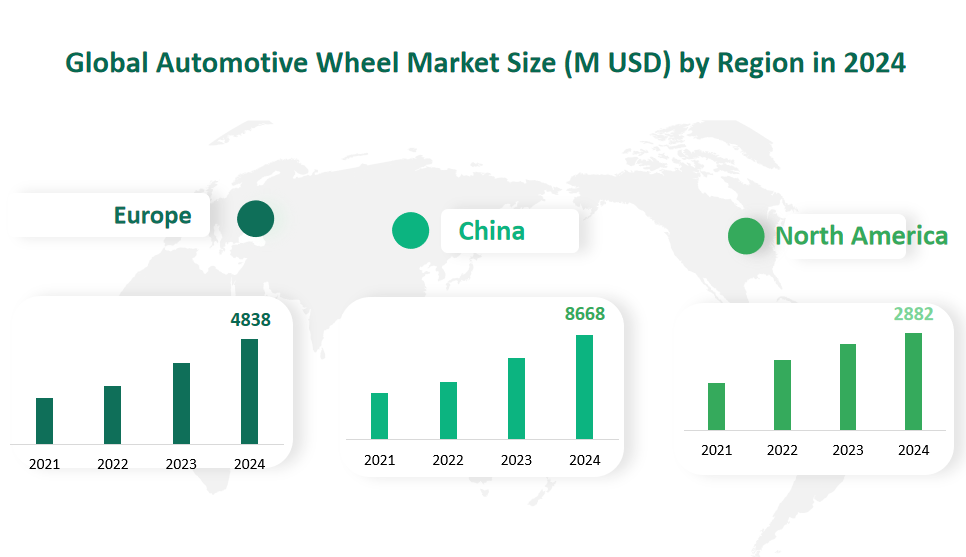1 Global Automotive Wheel Market Size (Value) and CAGR (2024-2033)
In 2024, the global Automotive Wheel market was valued at USD 22785 million, with a CAGR of 3.8% from 2024 to 2033.
A wheel is a circular metal frame with spokes or a solid disc mounted on a wheel hub. A vehicle tire is installed on the wheel frame, which is also called as a rim or alloy wheel. These are made from steel, aluminum, magnesium, carbon fiber, or a combination of all these metals.
Figure Global Automotive Wheel Market Size (M USD) and CAGR 2024-2033

2 Automotive Wheel Market Drivers
Increasing Automotive Production:
The global automotive industry has seen steady growth over the past decade, with increasing production volumes in major regions such as Asia-Pacific, Europe, and North America. This growth directly translates to higher demand for automotive wheels, as each vehicle requires multiple wheels.
Trend Towards Lightweight Vehicles:
The automotive industry is increasingly focusing on lightweight materials to improve fuel efficiency and reduce emissions. This trend has led to a higher demand for aluminum, magnesium, and carbon fiber wheels, which are lighter and more durable than traditional steel wheels.
Technological Advancements:
Innovations in wheel manufacturing, such as advanced casting techniques and the use of composite materials, have improved the performance and durability of wheels. These advancements have also made it possible to produce wheels that are both lightweight and strong, meeting the needs of modern vehicles.
3 Automotive Wheel Market Restraints
High Capital Requirements:
The automotive wheel industry requires substantial initial investments in machinery, equipment, and production facilities. The cost of setting up a manufacturing plant and purchasing advanced production and testing equipment is high. This makes it difficult for new entrants to enter the market and for existing players to expand their operations.
Stringent Quality Standards:
Automotive wheel manufacturers must meet strict quality and safety standards set by original equipment manufacturers (OEMs) and regulatory bodies. These standards ensure that wheels are reliable and safe for use in vehicles. However, they also create high barriers to entry for new players and increase the complexity and cost of production for existing manufacturers.
Fluctuating Raw Material Prices:
The prices of raw materials such as steel, aluminum, magnesium, and carbon fiber are subject to market fluctuations. These fluctuations can impact the production costs and profitability of wheel manufacturers. For example, a sudden increase in the price of aluminum can significantly affect the cost structure of manufacturers who rely heavily on this material.
4 Global Automotive Wheel Market Size by Type in 2024
Steel wheels are the most traditional type of automotive wheels, known for their durability and cost-effectiveness. They are primarily used in commercial vehicles and some passenger vehicles due to their robustness and ability to withstand heavy loads. In 2024, the market value for steel wheels is projected to be $5,947 million. This segment is expected to grow steadily, driven by the continued demand for commercial vehicles and the need for reliable, durable wheels in heavy-duty applications.
Alloy wheels, which are typically made from aluminum or magnesium, have gained significant popularity in recent years due to their lightweight nature and improved performance. These wheels enhance fuel efficiency and vehicle handling, making them a preferred choice for passenger vehicles. In 2024, the market value for alloy wheels is projected to be $16,434 million. This segment is further divided into cast alloy wheels and forged alloy wheels.
Carbon fiber wheels represent the cutting-edge of automotive wheel technology. These wheels are extremely lightweight and offer superior performance, making them ideal for high-performance and luxury vehicles. In 2024, the market value for carbon fiber wheels is projected to be $325 million. While their market share is relatively small compared to steel and alloy wheels, their growth potential is significant, driven by the increasing demand for lightweight and high-performance materials in the automotive industry.
Magnesium wheels are another type of lightweight wheels used in specific applications, particularly in racing and high-performance vehicles. They offer a high strength-to-weight ratio and can significantly reduce unsprung weight, improving vehicle handling and performance. In 2024, the market value for magnesium wheels is projected to be $79 million. Their use is currently limited due to higher production costs and specialized applications, but they hold promise for future growth as technology advances and costs decrease.
Table Global Automotive Wheel Market Size by Type in 2024
Type | Market Size (M USD) 2024 |
Steel | 5947 |
Alloy | 16434 |
Carbon Fibre | 325 |
Magnesium | 79 |
5 Global Automotive Wheel Market Size by Application in 2024
Passenger vehicles represent the largest segment of the automotive wheel market, driven by the high volume of production and the increasing demand for lightweight and high-performance wheels. In 2024, the market value for wheels used in passenger vehicles is projected to be $17,278 million. This segment includes a wide range of vehicles, from compact cars to luxury sedans and SUVs. The demand for alloy wheels, particularly aluminum and carbon fiber, is growing rapidly due to their lightweight nature and improved fuel efficiency. Passenger vehicles often prioritize aesthetics and performance, making alloy wheels a popular choice. Additionally, the trend towards electric vehicles (EVs) is further driving the demand for lightweight wheels to enhance battery range and overall vehicle efficiency.
Commercial vehicles, including trucks, buses, and other heavy-duty vehicles, account for a significant portion of the automotive wheel market. In 2024, the market value for wheels used in commercial vehicles is projected to be $5,507 million. Steel wheels remain the dominant choice in this segment due to their durability and ability to withstand heavy loads. However, the demand for lightweight alloy wheels is also increasing, particularly in applications where fuel efficiency and reduced emissions are critical. The growth in e-commerce and logistics sectors is driving the need for more efficient and reliable commercial vehicles, thereby increasing the demand for high-quality wheels.
Table Global Automotive Wheel Market Size by Application in 2024
Application | Market Size (M USD) 2024 |
Passenger Vehicle | 17278 |
Commercial Vehicle | 5507 |
6 Global Automotive Wheel Market Size by Region in 2024
North America is a mature market for automotive wheels, driven by the presence of major automotive manufacturers and a high demand for high-performance vehicles. In 2024, the market value for automotive wheels in North America is projected to be $2882 million. The region is characterized by a strong preference for alloy wheels, particularly in luxury and performance vehicles. The market is also influenced by stringent emissions regulations, which drive the demand for lightweight wheels to improve fuel efficiency.
Europe is another mature market for automotive wheels, with a strong focus on high-performance and luxury vehicles. In 2024, the market value for automotive wheels in Europe is projected to be $4838 million. The region is known for its advanced manufacturing capabilities and high demand for lightweight, high-performance wheels. The European market is also heavily influenced by environmental regulations, which drive the adoption of advanced materials and technologies to reduce emissions and improve fuel efficiency.
China is the largest market for automotive wheels, driven by its rapidly growing automotive industry and high production volumes. In 2024, the market value for automotive wheels in China is projected to be $8668 million. The market is characterized by a mix of steel and alloy wheels, with a growing demand for high-performance wheels in the luxury and electric vehicle segments. China’s market is also influenced by government policies aimed at promoting the adoption of new energy vehicles (NEVs) and reducing emissions.
Figure Global Automotive Wheel Market Size by Region in 2024

7 Major Players in Global Automotive Wheel Market
7.1 CITIC Dicastal
Company Profile:
CITIC Dicastal, established in 1988, is a leading manufacturer of aluminum wheels with a global presence. The company operates manufacturing plants in China, North America, Europe, and Africa. With a focus on innovation and quality, CITIC Dicastal has become a major player in the automotive wheel industry.
Business Overview:
CITIC Dicastal specializes in the development, production, and marketing of aluminum alloy wheels and auto aluminum parts. The company’s extensive distribution network and strong supply chain management have enabled it to serve customers worldwide. CITIC Dicastal’s products are known for their high quality and durability, making them a preferred choice for both original equipment manufacturers (OEMs) and the automotive aftermarket.
Product Introduction:
CITIC Dicastal offers a wide range of aluminum wheels, including cast and forged wheels. Their products are designed to enhance vehicle performance and aesthetics. The company’s recent innovations include lightweight wheels that improve fuel efficiency and reduce emissions. Their wheels are available in various sizes and designs, catering to different vehicle types and consumer preferences.
Financial Performance:
In the last year, CITIC Dicastal reported a revenue of $2,344 million, with a gross margin of 18.24%.
7.2 Iochpe-Maxion
Company Profile:
Iochpe-Maxion, established in 1918, is a global leader in automotive wheel production and a leading manufacturer of automotive structural components in the Americas. The company operates manufacturing plants across the Americas and serves customers worldwide.
Business Overview:
Iochpe-Maxion is known for its high-quality steel and aluminum wheels, which are used in a variety of automotive applications. The company’s extensive product range includes wheels for light vehicles, commercial vehicles, and agricultural machinery. Iochpe-Maxion’s commitment to innovation and sustainability has led to the development of advanced materials and manufacturing processes.
Product Introduction:
Iochpe-Maxion offers a comprehensive range of wheels, including aluminum light vehicle wheels and steel light vehicle wheels. Their aluminum wheels are designed with optimized technologies such as reduced rim thickness and hollow hump, making them lightweight and stylish. Their steel wheels are known for their durability and versatility, available in various sizes and finishes to meet different application needs.
Financial Performance:
In the last year, Iochpe-Maxion reported a revenue of $1,412 million, with a gross margin of 14.10%.
7.3 Ronal
Company Profile:
Ronal, established in 1969, is a leading global manufacturer of high-performance automotive wheels. The company operates manufacturing plants in Europe and serves customers worldwide. Ronal is known for its premium products and strong brand recognition in the automotive aftermarket.
Business Overview:
Ronal specializes in the production of high-performance wheels for passenger cars, commercial vehicles, and racing applications. The company’s focus on innovation and quality has led to the development of advanced wheel technologies and designs. Ronal’s products are widely recognized for their performance and durability, making them a preferred choice for high-end applications.
Product Introduction:
Ronal offers a range of high-performance wheels, including forged and cast wheels. Their products are designed to enhance vehicle performance and aesthetics, with a focus on lightweight materials and advanced manufacturing techniques. Ronal’s wheels are available in various sizes and designs, catering to different vehicle types and consumer preferences.
Financial Performance:
In the last year, Ronal reported a revenue of $1,373 million, with a gross margin of 20.53%.

